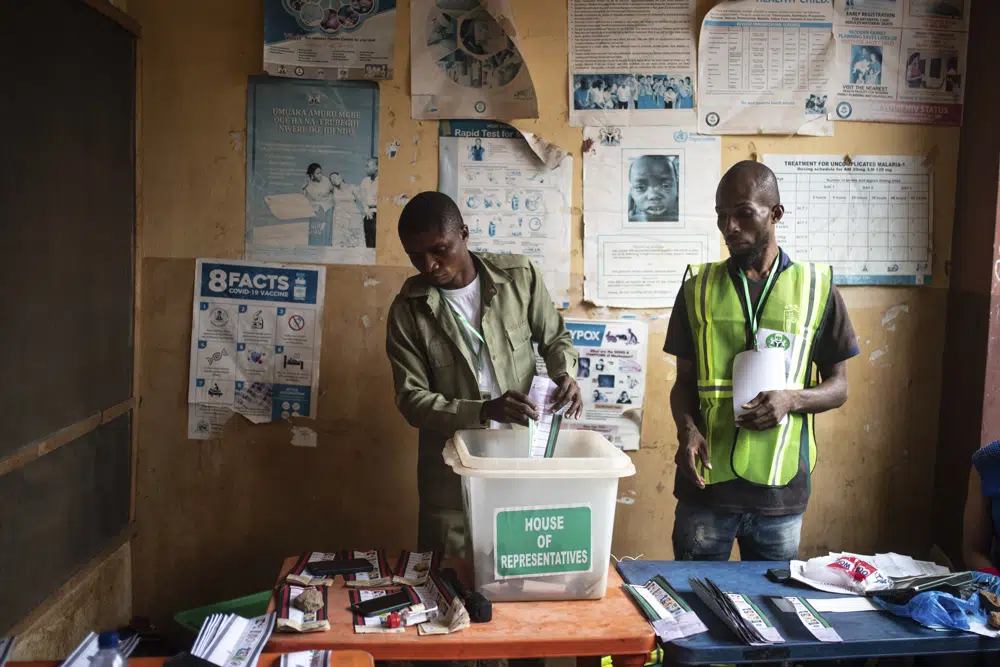Polls closed in Nigeria’s presidential election on Sunday evening after tens of millions cast their votes to decide a tight and unpredictable contest for the presidency and parliament of Africa’s most populous nation and its biggest economy but the Nigeria election results will not be announced for another few days. Despite fears of widespread chaos, the election was largely peaceful, but voting was delayed in some parts of the country due to technical glitches, late arrival of officials and some cases of violence, according to reports from civil society groups.
Who are the main candidates?
Nigeria has an electorate of 87 million, the largest democratic exercise in Africa. This election has seen an unprecedented challenge to the two-party system that has dominated Nigeria for 24 years. There are 73 presidential candidates, but Peter Obi from the relatively unknown Labour Party, Bola Tinubu from the ruling All Progressives Congress (APC) and Atiku Abubakar of the main opposition Peoples Democratic Party (PDP) are all seen as potential winners.
The presidential election was a two-horse race between President Muhammadu Buhari, 75, who is running for a second term, and Atiku Abubakar, 72, a former vice president. Mr Buhari, who is seeking re-election on the platform of the APC, was accused of failing to fulfil his promises to tackle corruption and insurgency in the country. He was also criticized for his government’s handling of the economy, which has been hit hard by the fall in oil prices.
Abubakar, a wealthy businessman who has been dogged by accusations of corruption and cronyism, which he denies, has promised to create jobs and improve the economy. His party, the PDP, ruled Nigeria for 16 years until Buhari’s APC defeated the then-incumbent President Goodluck Jonathan in 2015.
Were the elections peaceful?
The election was closely watched by observers from the African Union, the Economic Community of West African States (ECOWAS), and the Commonwealth, as well as by foreign diplomats and representatives of international organizations. There were concerns about the potential for violence, particularly in the volatile north-eastern states, where the Boko Haram insurgency has displaced millions of people and killed tens of thousands over the past decade.
The lead-up to the polls was overshadowed by a cash shortage caused by a botched attempt to redesign the currency, leading to widespread chaos at banks and cash machines as desperate people sought access to their money. The new notes were introduced in order to tackle inflation, and also vote-buying.
On the eve of the election, a member of the House of Representatives was arrested with almost $500,000 (£419,000) in cash, and a list of people he was supposed to give it to, police say. This has raised fears of vote-buying, which has been a major problem in previous elections in Nigeria.
Whoever wins will have to deal with a crumbling economy, high youth unemployment, and widespread insecurity which saw 10,000 killed last year. Voters also cast their ballots for 109 federal senators and 360 members of the house of representatives, with another vote for state governors in March. The winner of the presidential election will be inaugurated on May 29.
How are the votes counted?
In Nigeria, the votes in an election are counted manually. The counting process usually starts at the polling unit immediately after voting ends. The presiding officer of the polling unit is responsible for counting the votes in the presence of party agents, observers, and any interested members of the public.
The presiding officer first sorts the ballot papers into piles for each candidate or party. The votes for each candidate are then counted and recorded on the result sheet, which is then signed by the party agents present.
After the counting is completed at the polling unit, the presiding officer collates the results and fills out the appropriate forms, which are then sent to the ward collation center. The ward collation officer then adds up the results from all the polling units in the ward and sends them to the local government area collation center.
At the local government area collation center, the results from all the wards are added up and recorded on the appropriate forms. The collation officer then sends the results to the state collation center.
At the state collation center, the results from all the local government areas are added up and recorded on the appropriate forms. The collation officer then announces the results and declares the winner of the election.
When are the Nigeria election results expected?
According to the electoral chief Mahmood Yakubu, an official announcement of results could take between three and five days. However, it is possible that the winner of the presidency will be obvious much sooner as the count of individual polling stations becomes known. Officials from the electoral body in each of Nigeria’s 36 states will travel to the capital, Abuja, where the results will be announced state-by-state. Final results are not expected before Monday at the earliest, and possibly not until Wednesday. It is important to note that the delay in the announcement of results is not uncommon in Nigeria’s electoral history.
Image Credit: AP Photo/Ben Curtis





